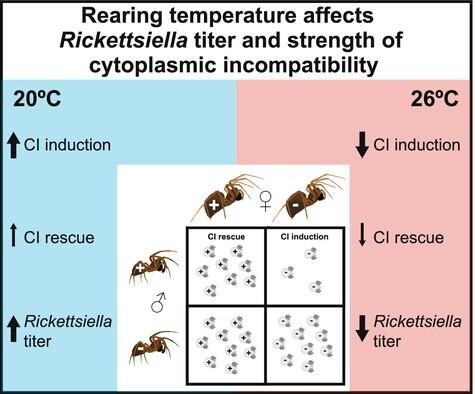当前位置:
X-MOL 学术
›
Environ. Microbiol.
›
论文详情
Our official English website, www.x-mol.net, welcomes your
feedback! (Note: you will need to create a separate account there.)
Warm temperature inhibits cytoplasmic incompatibility induced by endosymbiotic Rickettsiella in spider hosts
Environmental Microbiology ( IF 4.3 ) Pub Date : 2024-09-10 , DOI: 10.1111/1462-2920.16697 Jordyn D Proctor 1 , Virginija Mackevicius-Dubickaja 2 , Yuval Gottlieb 2 , Jennifer A White 1
Environmental Microbiology ( IF 4.3 ) Pub Date : 2024-09-10 , DOI: 10.1111/1462-2920.16697 Jordyn D Proctor 1 , Virginija Mackevicius-Dubickaja 2 , Yuval Gottlieb 2 , Jennifer A White 1
Affiliation

|
Bacterial endosymbionts manipulate reproduction in arthropods to increase their prevalence in the host population. One such manipulation is cytoplasmic incompatibility (CI), wherein the bacteria sabotage sperm in infected males to reduce the hatch rate when mated with uninfected females, but zygotes are ‘rescued’ when that male mates with an infected female. In the spider Mermessus fradeorum (Linyphiidae), Rickettsiella symbionts cause variable levels of CI. We hypothesised that temperature affects the strength of CI and its rescue in M. fradeorum , potentially mediated by bacterial titre. We reared Rickettsiella ‐infected spiders in two temperature conditions (26°C vs. 20°C) and tested CI induction in males and rescue in females. In incompatible crosses between infected males and uninfected females, the hatch rate from warm males was doubled (mean ± standard error = 0.687 ± 0.052) relative to cool males (0.348 ± 0.046), indicating that CI induction is weaker in warm males. In rescue crosses between infected females and infected males, female rearing temperature had a marginal effect on CI rescue, but the hatch rate remained high for both warm (0.960 ± 0.023) and cool females (0.994 ± 0.004). Bacterial titre, as measured by quantitative polymerase chain reaction, was lower in warm than cool spiders, particularly in females, suggesting that bacterial titre may play a role in causing the temperature‐mediated changes in CI.
中文翻译:

温暖的温度抑制蜘蛛宿主内共生立克次氏菌诱导的细胞质不相容性
细菌内共生体操纵节肢动物的繁殖,以增加其在宿主群体中的流行率。其中一种操作是细胞质不相容性(CI),其中细菌破坏受感染雄性的精子,以降低与未受感染雌性交配时的孵化率,但当雄性与受感染雌性交配时,受精卵得到“拯救”。在蜘蛛 Mermessus fradeorum(Linyphiidae)中,立克次体共生体会导致不同水平的 CI。我们假设温度会影响 CI 的强度及其对 M. fradeorum 的拯救,这可能是由细菌滴度介导的。我们在两种温度条件(26°C 与 20°C)下饲养感染立克次体的蜘蛛,并测试了雄性蜘蛛的 CI 诱导和雌性蜘蛛的拯救。在受感染的雄性和未感染的雌性之间的不亲和杂交中,相对于凉爽的雄性(0.348±0.046),温暖的雄性的孵化率增加了一倍(平均值±标准误差=0.687±0.052),表明温暖的雄性中CI诱导较弱。在受感染雌性和受感染雄性之间的救援杂交中,雌性饲养温度对 CI 救援具有边际影响,但温暖 (0.960 ± 0.023) 和凉爽雌性 (0.994 ± 0.004) 的孵化率仍然很高。通过定量聚合酶链反应测量,暖蜘蛛的细菌滴度低于冷蜘蛛,尤其是雌性蜘蛛,这表明细菌滴度可能在引起温度介导的 CI 变化中发挥作用。
更新日期:2024-09-10
中文翻译:

温暖的温度抑制蜘蛛宿主内共生立克次氏菌诱导的细胞质不相容性
细菌内共生体操纵节肢动物的繁殖,以增加其在宿主群体中的流行率。其中一种操作是细胞质不相容性(CI),其中细菌破坏受感染雄性的精子,以降低与未受感染雌性交配时的孵化率,但当雄性与受感染雌性交配时,受精卵得到“拯救”。在蜘蛛 Mermessus fradeorum(Linyphiidae)中,立克次体共生体会导致不同水平的 CI。我们假设温度会影响 CI 的强度及其对 M. fradeorum 的拯救,这可能是由细菌滴度介导的。我们在两种温度条件(26°C 与 20°C)下饲养感染立克次体的蜘蛛,并测试了雄性蜘蛛的 CI 诱导和雌性蜘蛛的拯救。在受感染的雄性和未感染的雌性之间的不亲和杂交中,相对于凉爽的雄性(0.348±0.046),温暖的雄性的孵化率增加了一倍(平均值±标准误差=0.687±0.052),表明温暖的雄性中CI诱导较弱。在受感染雌性和受感染雄性之间的救援杂交中,雌性饲养温度对 CI 救援具有边际影响,但温暖 (0.960 ± 0.023) 和凉爽雌性 (0.994 ± 0.004) 的孵化率仍然很高。通过定量聚合酶链反应测量,暖蜘蛛的细菌滴度低于冷蜘蛛,尤其是雌性蜘蛛,这表明细菌滴度可能在引起温度介导的 CI 变化中发挥作用。






























 京公网安备 11010802027423号
京公网安备 11010802027423号